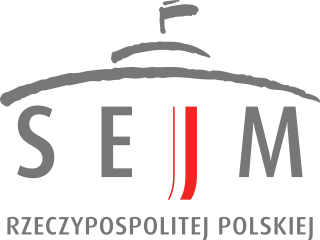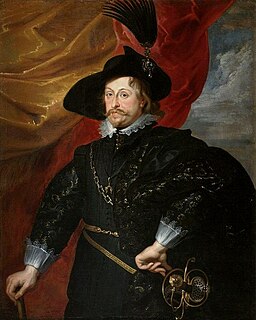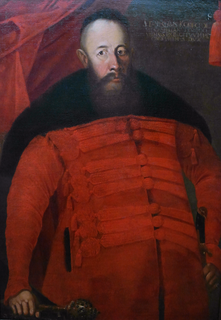
Marcin Ruar (German Martin Ruar, Latin Ruarius), pseudonym Aretius Crispinus) (1589–1657) was a Socinian writer, advocate of religious tolerance, and rector of the Racovian Academy from 1620 to 1622. [1]

The Racovian Academy was a Socinian school operated from 1602 to 1638 by the Polish Brethren in Raków, Sandomierz Voivodeship of Lesser Poland. The communitarian Arian settlement of Raków was founded in 1569 by Jan Sienieński. The academy was founded in 1602 by his son, Jakub Sienieński. The zenith of the academy was 1616–1630. It was contemporaneous with the Calvinist Pińczów Academy, which was known "as the Sarmatian Athens". It numbered more than 1,000 students, including many foreigners. At this point it is estimated that ten to twenty percent of Polish intellectuals were Arians.
Ruar was born in Krempe, Holstein, the son of a Lutheran preacher. He studied in Altdorf, where he became acquainted with and adopted the non-trinitarian of Fausto Sozzini, and then studied law at Leiden. He was a polyglot making frequent travels through Denmark, France, Italy, the Netherlands and the countries of Germany, promoting non-trinitarian teaching and pleas for tolerance, publishing and earning a reputation as one of the most educated men of his era. He was offered a professorship at Cambridge, but rejected the proposal, due to the requirement to acknowledge the Trinity. He moved to Poland in 1614 and was appointed rector of the Racovian Academy for three years in the 1620s, but resigned because of the burdens of the teaching and administration.

Krempe is a town in the district of Steinburg, in Schleswig-Holstein, Germany. It is situated between Itzehoe and Glückstadt. Krempe is part of the Amt Krempermarsch.

The University of Altdorf was a university in Altdorf bei Nürnberg, a small town outside the Free Imperial City of Nuremberg. It was founded in 1578 and received university privileges in 1622 and was closed in 1809 by Maximilian I Joseph of Bavaria.

Fausto Paolo Sozzini, also known as Faustus Socinus or Faust Socyn (Polish), was an Italian theologian and founder of the school of Christian thought known as Socinianism and the main theologian of the Minor Reformed Church of Poland.
In 1631 Ruar moved to Gdańsk, where he was a minister in the German-speaking Socinian congregation. Known for his humanist and liberal views, Ruar was not doctrinaire and tried to reconcile Socinians with the Mennonite Remonstrants. Journeying to the Netherlands Ruar established contacts between the Polish Arians and the Dutch Remonstrant movement and with Jacobus Arminius. [2] However his position against the Trinity remained clear, as in extensive correspondence with Remonstrants, such as the minister of Hazerswoude, Samuel Naeranus, on the Trinity. [3]
Arianism is a nontrinitarian Christological doctrine which asserts the belief that Jesus Christ is the Son of God who was begotten by God the Father at a point in time, a creature distinct from the Father and is therefore subordinate to him, but the Son is also God. Arian teachings were first attributed to Arius, a Christian presbyter in Alexandria of Egypt. The teachings of Arius and his supporters were opposed to the theological views held by Homoousian Christians, regarding the nature of the Trinity and the nature of Christ. The Arian concept of Christ is based on the belief that the Son of God did not always exist but was begotten within time by God the Father.

Jacobus Arminius,, the Latinized name of Jakob Hermanszoon, was a Dutch theologian from the Protestant Reformation period whose views became the basis of Arminianism and the Dutch Remonstrant movement. He served from 1603 as professor in theology at the University of Leiden and wrote many books and treatises on theology.
Hazerswoude is a former municipality in the Dutch province of South Holland. It contained the towns of Hazerswoude-Dorp and Hazerswoude-Rijndijk, and the villages of Groenendijk and Bent.
In 1643 Ruar had married the daughter of Martin Voss, from a well-off and prominent Gdańsk family and converted his wife, her family, friends and many citizens. These conversions did not escape the attentions of the city council, most of whom belonged to the local Lutheran Church. Following the 1638 decision of the Sejm which drove the Polish brethren from Raków and closed the Racovian Academy, the Gdańsk city council moved to exile Ruar. However, as a lawyer Ruar demanded an official trial, appealing to the support of the Polish magnates who were patrons of the Polish Brethren. Ruar argued that the doctrine of his faith, wrongly called "Arianism," was in reality based on the Bible. The city council relented, providing Ruar was to cease converting Lutherans. After five years Ruar received from King Władysław IV Vasa a certificate of immunity, and began again to convert Lutheran burghers of the city, which in 1643 resulted in a further banishment from Gdańsk - with his father in law Voss, the doctor Florian Crusius, Daniel Zwicker, the secretary of the council Ladebach and the eighty-year-old barber Werner David Buttel, with their families.

The Sejm of the Republic of Poland is the larger, more powerful lower house of the Polish parliament. It consists of 460 deputies elected by universal ballot and is presided over by a speaker called the "Marshal of the Sejm of the Republic of Poland". In the Kingdom of Poland, "Sejm" referred to the entire three-chamber parliament of Poland, comprising the Chamber of Envoys, the Senate and the King. It was thus a three-estate parliament. Since the Second Polish Republic (1918–1939), "Sejm" has referred only to the larger house of the parliament; the upper house is called the Senat Rzeczypospolitej Polskiej.
The Polish Brethren were members of the Minor Reformed Church of Poland, a Nontrinitarian Protestant church that existed in Poland from 1565 to 1658. By those on the outside, they were called "Arians" or "Socinians", but themselves preferred simply to be called "Brethren" or "Christians," and, after their expulsion from Poland, "Unitarians".

Władysław IV Vasa or Ladislaus IV Vasa was king of Poland of the House of Vasa who ruled from 1632 until his death in 1648. He was elected Tsar of Russia by the Seven Boyars in 1610, but did not assume the throne due to his father's position and a popular uprising.
Ruar initially went to Warsaw, where he tried to gain support for the Socinian cause, arguing that his deportation was the beginning of religious persecution in Poland. Although he was conditionally allowed to return to Gdańsk, henceforth Ruar preferred to live outside the city, in Straszyn, where he spent the rest of his life, writing, preaching, corresponding with the congregation in Gdansk, and with scholars abroad under the protection of the hetman Stanisław Koniecpolski. During this period he again travelled widely and freely, visiting England and Italy. He died in Straszyn near Gdańsk.

Stanisław Koniecpolski was a Polish military commander, regarded as one of the most talented and capable in the history of the Polish-Lithuanian Commonwealth. He was also a magnate, a royal official (starosta), a castellan, a member of the Polish nobility (szlachta), and the voivode (governor) of Sandomierz from 1625 until his death. He led many successful military campaigns against rebelling Cossacks and invading Tatars. From 1618 he held the rank of Field Crown Hetman before becoming the Grand Crown Hetman, the military commander second only to the King, in 1632.

Straszyn is a village in the administrative district of Gmina Pruszcz Gdański, within Gdańsk County, Pomeranian Voivodeship, in northern Poland. It lies approximately 4 kilometres (2 mi) west of Pruszcz Gdański and 12 km (7 mi) south of the regional capital Gdańsk.
Ruar was an advocate of separation of church authority from natural sciences. In 1643 Marin Mersenne, sought from a J. Fabricius (a student from Gdańsk in Paris, apparently no relation to the astronomer), a Socinian with whom Mersenne could correspond concerning the Copernican heliocentrism of Pierre Gassendi, and was introduced to Ruar. However Ruar was already familiar with Gassendi's works, and replied to Mersenne that such matters should be left to science, not wait the adjudication of the church. [4]

Marin Mersenne, Marin Mersennus or le PèreMersenne was a French polymath, whose works touched a wide variety of fields. He is perhaps best known today among mathematicians for Mersenne prime numbers, those which can be written in the form Mn = 2n − 1 for some integer n. He also developed Mersenne's laws, which describe the harmonics of a vibrating string, and his seminal work on music theory, Harmonie universelle, for which he is referred to as the "father of acoustics". Mersenne, an ordained priest, had many contacts in the scientific world and has been called "the center of the world of science and mathematics during the first half of the 1600s" and, because of his ability to make connections between people and ideas, "the post-box of Europe". He was also a member of the Minim religious order and wrote and lectured on theology and philosophy.

Gdańsk is a Polish city on the Baltic coast. With a population of 464,254, Gdańsk is the capital and largest city of the Pomeranian Voivodeship and the capital of Kashubia. It is Poland's principal seaport and the centre of the country's fourth-largest metropolitan area.

Pierre Gassendi was a French philosopher, priest, astronomer, and mathematician. While he held a church position in south-east France, he also spent much time in Paris, where he was a leader of a group of free-thinking intellectuals. He was also an active observational scientist, publishing the first data on the transit of Mercury in 1631. The lunar crater Gassendi is named after him.


